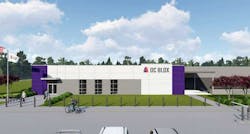Subsea Links: DC BLOX, Flexential, Cologix Connect to Cable Projects
The geography of subsea cables is changing, and data center providers are responding with new facilities and partnerships. That trend was on display in several announcements this week, where several providers announced new cable landing stations (CLS) and connections to bring subsea traffic onto their networks.
DC BLOX Building CLS in Myrtle Beach
DC BLOX, a regional data center specialist serving the Southeastern U.S., is planning to build a new cable landing station in Myrtle Beach, South Carolina. The new CLS will anchor subsea cable systems connecting North America’s Southeast region with other continents.
With the announcement, DC BLOX is seeking to be an early move and capitalize on plans for subsea cables to land in Myrtle Beach, which it called “a beacon for hyperscalers and communications carriers looking to land subsea cables off the Southeast coast due to the regional connectivity and proximity to both the Atlanta and Ashburn markets.”
DC BLOX didn’t mention any of the cables it might support. But Myrtle Beach is expected to be a landing site for two cables, according to TeleGeography. The first is the Google Firmina system that will connect to South America with landings in Brazil. Uruguay and Argentina. The other as Confluence 1, a new cable system that will provide a subsea option for connectivity between markets along the East Coast of the U.S., landing in Virginia Beach, Wall, N,J, and Jacksonville.
“This new project represents a turning point for DC BLOX as we continue to scale and realize our vision to serve locally and connect globally,” said Jeff Uphues, CEO of DC BLOX.”The Southeast is exploding with opportunity and investments in digital infrastructure are key to its growth. Our continued investments in data centers and network infrastructure are a benefit to hyper-scalers, carriers, and enterprises across the region. This new project represents a turning point for DC BLOX as we continue to scale and realize our vision to serve locally and connect globally.”
DC BLOX’s planned Myrtle Beach CLS is designed to withstand a category 5 hurricane, is engineered to Uptime Institute’s Tier III standards, and will be SOC 2 Type II and NIST 800-171 compliant. The power generation configurations include up to 15 MW of AC power with managed rectifiers for DC Power Feed Equipment (PFE). When complete, the facility will be connected to five pre-positioned subsea bore pipes configured for up to five subsea cables. In addition, traditional colocation for communications providers, local enterprises, governments, and customer partner networks will be available. The CLS design assures concurrently maintainable 2N power generation, UPS and switchgear, with indirect adiabatic and evaporation cooling for efficiency and sustainability with N+1 redundancy.
The Myrtle Beach CLS, to be located in the International Technology and Aerospace Park (ITAP), will be DC BLOX’s second location in South Carolina. DC BLOX plans for its new CLS to be completed in the second quarter of 2023. As a result, Myrtle Beach is now a beacon for hyper-scalers and communications carriers looking to land subsea cables off the Southeast coast due to the regional connectivity and proximity to both the Atlanta and Ashburn markets.
Flexential Connects With Angola Cables
In recent months we’ve been writing about the growth of the data center industry in Africa, including new interest from U.S.-based technology companies. Data center provider Flexential is partnering with Angola Cables to connect to the Southern and West African markets through Flexential’s Fort Lauderdale data center, a landing site for the MONET cable system to South America.
Flexential’s partnership with Angola will procide direct access to the AngoNAP Tier III data center in Fortaleza, Brazil and the South Atlantic Cable System landing station, which connects to points in Africa.
“Our partnership with Flexential will strengthen interconnection options across southern and West Africa,” said Ângelo Gama, CEO of Angola Cables. Gama says that this high-capacity connectivity is well-suited to serve multiple industries from the oil and gas sector to scientific and academic research. “Plugging into Flexential’s extensive network of data centers in the U.S. will benefit our clients in Africa by not only extending their presence and exposure to the highly active U.S. market but will open up further opportunities for enterprises in Africa to establish direct connections with parent companies, subsidiaries, business partners and suppliers across the U.S.”
“Given the significant presence we’re already seeing from customers, including over-the-top (OTT) providers, hyperscalers and Fortune 500 companies in the African region, we’re excited to bring these organizations a new level of international capacity and connectivity via new cross connect options,” said Tim Parker, Senior Vice President, Network Strategy, Flexential. “The extension of the MONET cable into Fort Lauderdale is a significant step forward for international connectivity.”
Cologix Connects With Crosslake
Cologix announced a new partnership with Crosslake Fibre, a developer of unique submarine and terrestrial fiber networks, including a cross-lake system that runs fiber across Lake Ontario. Crosslake Fibre has contracted for space and power services in Cologix’s TOR1 facility to enable customers to connect with financial and technology markets in Toronto, Canada to both New York and Chicago.
“Cologix 151 Front Street is a highly strategic location for interconnection to our unique network services,” said Fergus Innes, Chief Commercial Officer of Crosslake Fibre. “The Cologix platform gives us access to more markets, carriers, clouds and countries. Cologix is in tune with the growing demand for subsea connectivity and is well positioned to scale alongside us.”
“Hosting Crosslake Fibre’s Toronto submarine cable endpoint spanning Lake Ontario opens an additional Canada-U.S. corridor that is the fastest, most direct route from Toronto to New York and Chicago,” said Cologix President and Chief Revenue Officer Laura Ortman. “Together, we share a vision of reducing latency and connecting the world at greater speeds.”
Cologix operates seven discrete suites at TOR1, located at 151 Front Street, which is Canada’s largest and most important telecommunications hub and home to the Toronto Internet Exchange (TorIX). With 20,000+ interconnections, 600+ networks, 300+ cloud providers and 29 onramps in North America, Cologix interconnection ecosystem provides superior, high-speed connections and customer choice.
“Toronto is rapidly growing into a critical core for the next generation of business-critical fibre to enable the future of colocation,” said Innes. “We’re excited to partner with Cologix to expand connections in this key technology hub.”
About the Author



